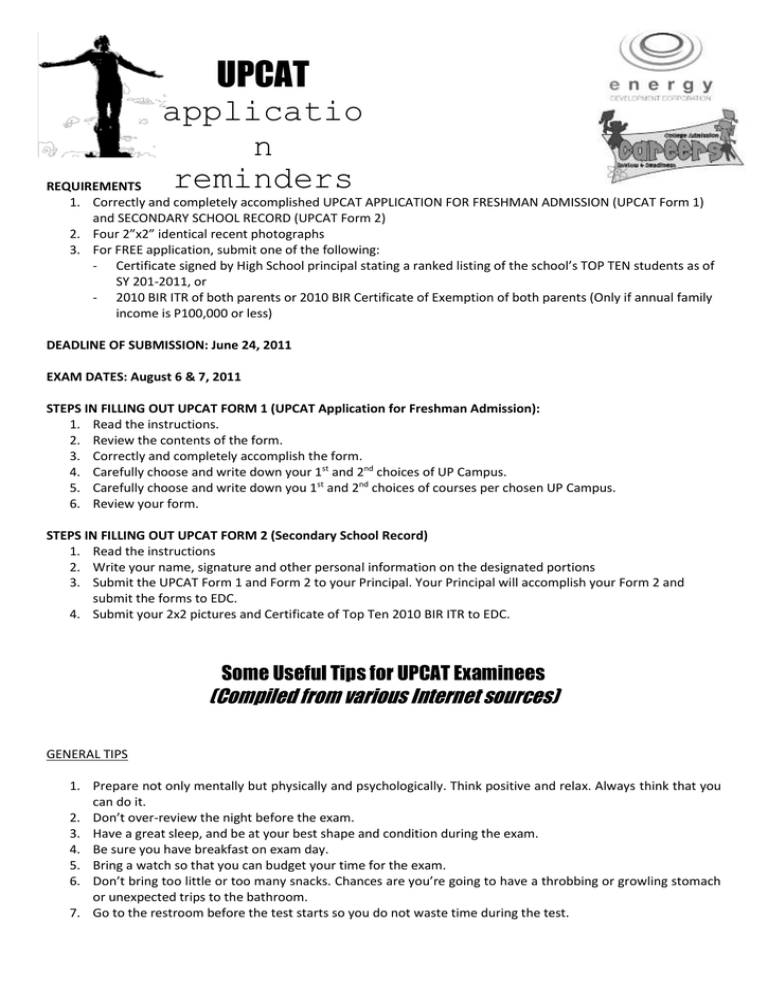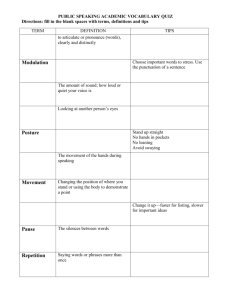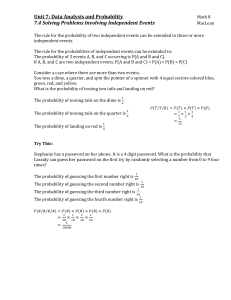UPCAT Application Reminders & Exam Tips
advertisement

UPCAT applicatio n reminders REQUIREMENTS 1. Correctly and completely accomplished UPCAT APPLICATION FOR FRESHMAN ADMISSION (UPCAT Form 1) and SECONDARY SCHOOL RECORD (UPCAT Form 2) 2. Four 2”x2” identical recent photographs 3. For FREE application, submit one of the following: - Certificate signed by High School principal stating a ranked listing of the school’s TOP TEN students as of SY 201-2011, or - 2010 BIR ITR of both parents or 2010 BIR Certificate of Exemption of both parents (Only if annual family income is P100,000 or less) DEADLINE OF SUBMISSION: June 24, 2011 EXAM DATES: August 6 & 7, 2011 STEPS IN FILLING OUT UPCAT FORM 1 (UPCAT Application for Freshman Admission): 1. Read the instructions. 2. Review the contents of the form. 3. Correctly and completely accomplish the form. 4. Carefully choose and write down your 1st and 2nd choices of UP Campus. 5. Carefully choose and write down you 1st and 2nd choices of courses per chosen UP Campus. 6. Review your form. STEPS IN FILLING OUT UPCAT FORM 2 (Secondary School Record) 1. Read the instructions 2. Write your name, signature and other personal information on the designated portions 3. Submit the UPCAT Form 1 and Form 2 to your Principal. Your Principal will accomplish your Form 2 and submit the forms to EDC. 4. Submit your 2x2 pictures and Certificate of Top Ten 2010 BIR ITR to EDC. Some Useful Tips for UPCAT Examinees (Compiled from various Internet sources) GENERAL TIPS 1. Prepare not only mentally but physically and psychologically. Think positive and relax. Always think that you can do it. 2. Don’t over-review the night before the exam. 3. Have a great sleep, and be at your best shape and condition during the exam. 4. Be sure you have breakfast on exam day. 5. Bring a watch so that you can budget your time for the exam. 6. Don’t bring too little or too many snacks. Chances are you’re going to have a throbbing or growling stomach or unexpected trips to the bathroom. 7. Go to the restroom before the test starts so you do not waste time during the test. 8. Check your seat as soon as you arrive. If you are left-handed, ask for a chair fit for a left-handed person. Ask for a change of seats if water is dripping on your head, the air-con is directly facing you, the sun is in your eyes or whatever else makes you uncomfortable. 9. Scratch paper will be provided. If you write extra big letters, you may need more scratch papers. Ask the proctor for more immediately. 10. READ AND FOLLOW INSTRUCTIONS CAREFULLY. 11. Look over the exam and plan your strategy for answering it. Budget your time. For example, if a sub-test has 60 items and you are given 70 minutes to finish it, allot 60 minutes for answering and 10 minutes for checking and reviewing. See to it that you are answering one item per minute. 12. All items have equal points even if others are harder to answer. Answer first the questions you think you know very well and skip the difficult ones. Be sure to get back to them later if you still have time. 13. Read the stories in the reading comprehension as fast as you can. But remember, you should be able to understand them. The reading comprehension is one of the most time-consuming parts of the exam. 14. Make intelligent guesses for questions you really do not know. Eliminate ridiculous choices. 15. Tests are not perfect. Do not waste your time pointing out to the proctor items you think have some kind of error. 16. If in the middle of the test you feel tired or sleepy, stand up and stretch. 17. Many proctors make unnecessary noises. Try to ignore them as much as possible. 18. Do not leave until the proctor says you can, even if half the group has already left. Use the extra time to review your answers. 19. Pray and hope for the best. MATH TIPS & STRATEGIES Expect a lot of stuff drawn from your high school math classes: algebra, geometry, trigonometry, etc. You may come across questions on ratio and proportion, polynomial factoring and length calculation. For example, you may be asked to calculate the length of a side of a triangle given the lengths of the other two sides. But for most of the UPCAT, all you’ll need are the more basic concepts. Simply knowing how to perform certain operations can already save you a lot of trouble on the test. Some geometry is also required for the UPCAT, but restrict your review to just the basics. You’ll definitely need to know about the basic 2D and 3D shapes, as well as each of their properties. Though it’s a considerably smaller part of the math section, practicing your trigonometry can give your UPCAT score a boost up. At the very least know the basic trigonometric values and identities so that you’re not left guessing numbers come test day. You don’t want to spend too much time here, though, as there’s not very many of these items. Budget your time and answer questions in that ascending order of difficulty. That way, you’ll get build up points as well as much-needed morale early on for the harder questions down the road. SCIENCE TIPS & STRATEGIES As with the math portion of the UPCAT, the science portion contains stuff you should already be familiar with. Questions usually cover general science, biology, physics, chemistry and Earth science as well. For example, you may be pressed for the different parts of the cell and their corresponding functions. The test may also ask you to solve for the amount of voltage or current in a particular situation, or it may ask you to describe what happens to an object that is in motion under certain circumstances. Follow the same general strategy that you do for other sections: pray beforehand, attack the easy questions first, go for the harder ones next. Budget your time, and be mindful of the fact that a fourth of a point will be deducted from your score if you answer incorrectly. The trick to science questions is to simply compare the answers you get from your own calculations with the options provided for multiple choice questions. From there, just find the choice (rounded down or rounded up) closest to your computed answer and eliminate the rest. Exercise caution, as sometimes the question will include certain irrelevant bits of information just to confuse you. ENGLISH/LANGUAGE TIPS & STRATEGIES Practice your reading comprehension, particularly looking for and understanding context clues. This will make a large chunk of the exam easier for you, and will serve as a backup plan when you encounter vocabulary words you’ve never seen. Critical reading is also a must; learn to spot cause-and-effect pairings as well as critical events and key characters. Speed reading isn’t really a very crucial skill to passing the UPCAT, but it has a definite plus. There’s a lot of reading to be done in the test, many of them involving big blocks of text. Knowing how to skim and speed read can save you a lot of time and give you larger leeway to carefully think about your answers or review. Vocabulary is one part of the UPCAT that many find difficult, not in the least because of the quality of English education in the country. One thing you should never do is to just memorize every single word with a corresponding definition. The content for the English and the Reading Comprehension sections is pretty straightforward. You’ll likely face questions that will have you completing unfinished sentences, arranging mixed-up things in chronological order and correcting grammatical errors. Be sure to mind those tricky tenses, spelling, punctuation and subject-verb agreement thingies, too. Attacking these sections is a bit of a balancing act. The time pressure involved makes it necessary to read through the text as quickly as you can without compromising your understanding of it. OTHER REMINDERS In the UPCAT, there is no penalty for leaving a question blank, but an incorrect answer costs you ¼ of a point. Some students guess really well. But you need to understand that these students have mastered the art of smart guessing as compared to those who guess poorly and used to “wild guessing”. It is better if you know whether you are a good strategist in guessing the correct answer or not. So while reviewing for the UPCAT, assess your guessing skill so that you will be more confident when you need to guess in the actual test.





